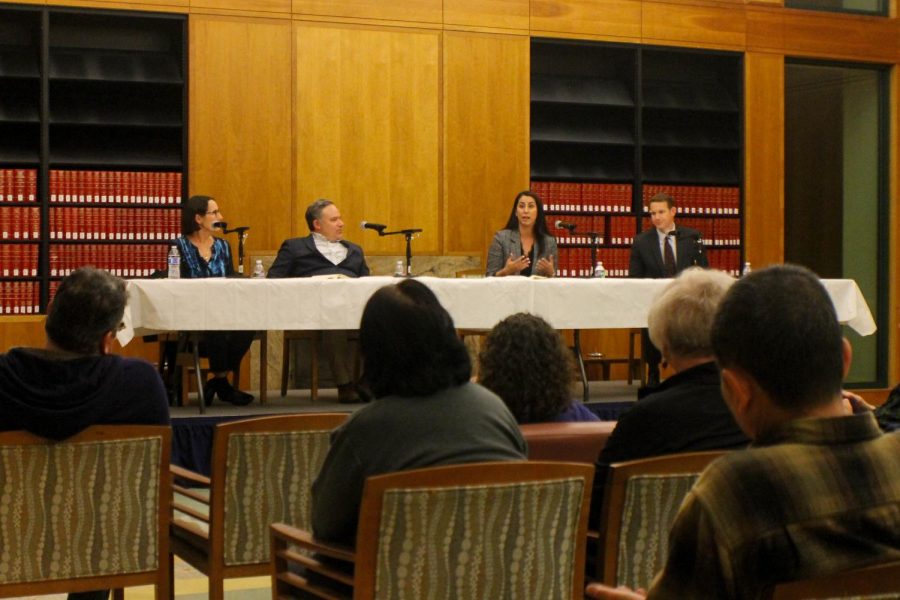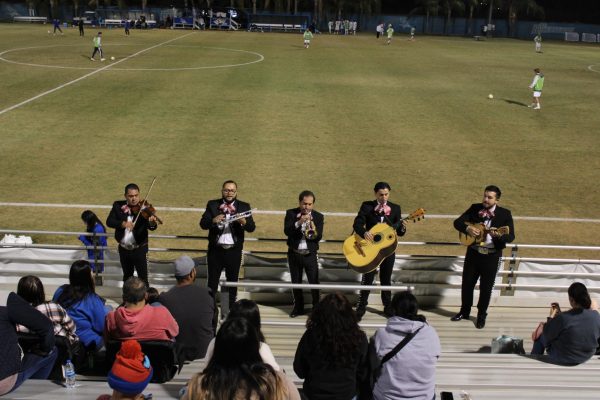Panel talks immigrant detention centers
Panelists discuss local immigration issues to crowd on Feb. 13, 2019.
February 27, 2019
Between U.S. Immigration and Customs Enforcement facilities, migrant caravans, and discussions of the border wall, immigration remains a controversial topic in the nation. Due to recent events, the topic of immigration is being even more analyzed in local communities.
On Feb. 13, 2019, CSU Bakersfield’s Kegley Institute of Ethics and the Pre-Law Society hosted a panel discussion titled, “Immigration Behind Bars: Activist, Legal, and Education Perspectives.” This free and public event introduced local immigration laws, agencies and practices of immigrant family detention, and other impacts from immigration in Kern County.
Ambar Tovar, the directing attorney with the United Farm Workers Foundation, was one of three panelists that gave insight on Mesa Verde, Kern County’s immigration detention center.
“The majority of people held in Mesa Verde are held without legal counsel,” said Tovar.
Mesa Verde has the capacity to hold 400 individuals-300 women and 100 men. Although the department is local, all detainees of Mesa Verde, including young detainees, and their families are required to travel to San Francisco for mandatory hearings.
“You’re expecting a 2-year-old or 4-year-old to go to a legal proceeding without legal counsel by their side,” said Tovar.
According to the American Immigration Council, represented immigrants in detention who had legal representation were four times more likely to be released from detention, than a detainee without legal representation.
Mesa Verde detainees also face the obstacle of bonds being set at high amounts, which are unaffordable for many.
“You have no right to legal counsel unless you can afford one,” said Tovar.
Adam Sawyer, director of CSUB’s liberal studies program, discussed how immigration laws affect the children of immigrant detainees and their education.
“Learning does not happen when there is high degree of trauma,” said Sawyer.
Children held in immigration shelters have academic assessment within 72 hours of detainment, which is followed with six hours of learning English.
Sawyer mentioned the best case scenario for these children is to be released into the arms of a caregiver. Immigrant children still have the right to public education and cannot be discriminated against due to their immigration status.
“We know from six decades of research that removal from a primary caregiver, depending on length of separation, can increase a risk for anxiety, depression, PTSD, ADHD, and cardiovascular disease,” said Sawyer.
Sawyer advocated for maximizing the best learning environment for immigrant children. The panel discussed that it is uncertain just how many children are being affected.
Mesa Verde is operating in Bakersfield’s backyard, and while all this is happening, what can be done to help detainees? After the panelists presented, the audience asked questions.
Among was professor Gonzalo Santos, an Associate Professor of Sociology, who said, “Wake up, [go] to vote and elect people like Alexandria Ocasio-Cortez.”
Santos shifted his focus by stressing the importance of electing the right officials who will fix the immigration system.
Jeannie Parent, professor of English for Multilingual Studies at Bakersfield College, was another panelist. She informed the community on what steps can be taken to aid detainees.
“We need volunteers, especially Spanish speakers, who can provide company twice a week,” said Parent.
Parent also invited non-Spanish speakers to volunteer, noting that many detainees have been in the country for over 20 years and speak English.
Many detainees have no family to be released to and need hosts while they get back on their feet.
“This is happening in our back yard, to our neighbors, or the people we come across in church,” said Tovar.







